Abstract
Cell Transplantation: A Novel Therapeutic Modality for Cerebral Palsy with Co-Morbid Intellectual Disability
Background: Cerebral palsy (CP) is a non-progressive disorder. The global incidence of neonatal CP is 1-5 per 1000 live births where 45% of children with CP have a comorbid intellectual disability (ID). This affects the quality of life and reduces life expectancy of affected individuals.
Methods and findings: With an aim to study the efficacy and safety of autologous bone marrow mononuclear cells (BMMNCs) transplantation in CP with ID, we administered a 17-year-old boy with BMMNCs along with neurorehabilitation. On follow up after 6 months, clinical improvements were recorded in speech, fine motor skills, ambulation, oromotor skills, social awareness, cognitive skills, memory and attention. Comparative Positron Emission Tomography- Computer Tomography scan of brain before and six months after cell transplantation revealed improved metabolism in the anterior cingulate cortex, left caudate head, thalamus, medial temporal cortex, cerebellum. Intelligent Quotient improved from 21 to 29. Social age according to the Vineland Social Maturity Scale was increased by 1 year. Functional Independence Measure and Gross Motor Functional Measure increased from 22 to 26 and 74.65 to 76 respectively. On Gross Motor Functional Classification System, he improved from IV to III.
Conclusion: These changes suggest that BMMNCs transplantation along with neurorehabilitation was effective for this child suffering from CP with ID.
Keywords
Cerebral palsy; Intellectual disability; Autologous bone marrow mononuclear cells; Cell transplantation; Positron emission tomography-computer tomography
Author(s):
Alok Sharma, Hemangi Sane, Nandini Gokulchandran, Pooja Kulkarni, Alitta Jose, Vishal Ganar, Samson Nivins and Prerna Badhe
Abstract | Full-Text | PDF
Share this

Google scholar citation report
Citations : 37
Journal of Neuropsychiatry received 37 citations as per google scholar report
Abstracted/Indexed in
- Google Scholar
- China National Knowledge Infrastructure (CNKI)
- Secret Search Engine Labs
- Euro Pub
Open Access Journals
- Aquaculture & Veterinary Science
- Chemistry & Chemical Sciences
- Clinical Sciences
- Engineering
- General Science
- Genetics & Molecular Biology
- Health Care & Nursing
- Immunology & Microbiology
- Materials Science
- Mathematics & Physics
- Medical Sciences
- Neurology & Psychiatry
- Oncology & Cancer Science
- Pharmaceutical Sciences

